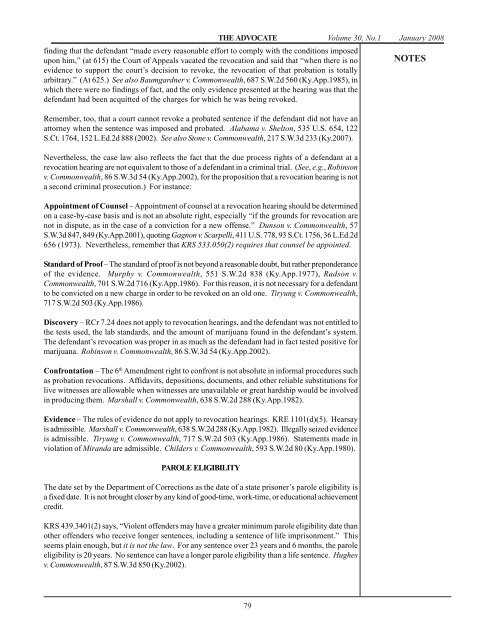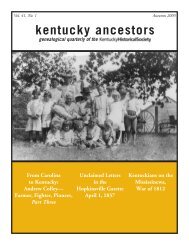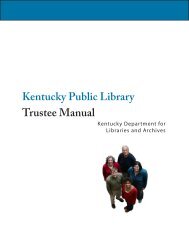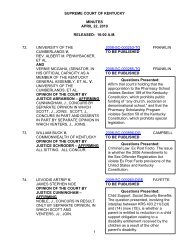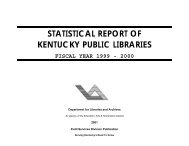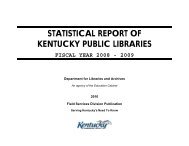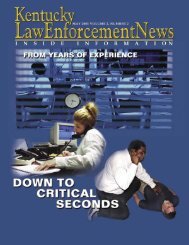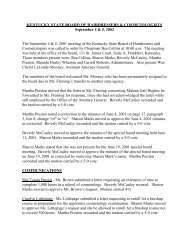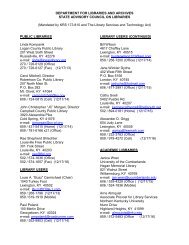Jan08 Advo.pmd - e-archives Home
Jan08 Advo.pmd - e-archives Home
Jan08 Advo.pmd - e-archives Home
You also want an ePaper? Increase the reach of your titles
YUMPU automatically turns print PDFs into web optimized ePapers that Google loves.
THE ADVOCATE Volume 30, No.1 January 2008<br />
finding that the defendant “made every reasonable effort to comply with the conditions imposed<br />
upon him,” (at 615) the Court of Appeals vacated the revocation and said that “when there is no<br />
evidence to support the court’s decision to revoke, the revocation of that probation is totally<br />
arbitrary.” (At 625.) See also Baumgardner v. Commonwealth, 687 S.W.2d 560 (Ky.App.1985), in<br />
which there were no findings of fact, and the only evidence presented at the hearing was that the<br />
defendant had been acquitted of the charges for which he was being revoked.<br />
Remember, too, that a court cannot revoke a probated sentence if the defendant did not have an<br />
attorney when the sentence was imposed and probated. Alabama v. Shelton, 535 U.S. 654, 122<br />
S.Ct. 1764, 152 L.Ed.2d 888 (2002). See also Stone v. Commonwealth, 217 S.W.3d 233 (Ky.2007).<br />
Nevertheless, the case law also reflects the fact that the due process rights of a defendant at a<br />
revocation hearing are not equivalent to those of a defendant in a criminal trial. (See, e.g., Robinson<br />
v. Commonwealth, 86 S.W.3d 54 (Ky.App.2002), for the proposition that a revocation hearing is not<br />
a second criminal prosecution.) For instance:<br />
Appointment of Counsel – Appointment of counsel at a revocation hearing should be determined<br />
on a case-by-case basis and is not an absolute right, especially “if the grounds for revocation are<br />
not in dispute, as in the case of a conviction for a new offense.” Dunson v. Commonwealth, 57<br />
S.W.3d 847, 849 (Ky.App.2001), quoting Gagnon v. Scarpelli, 411 U.S. 778, 93 S.Ct. 1756, 36 L.Ed.2d<br />
656 (1973). Nevertheless, remember that KRS 533.050(2) requires that counsel be appointed.<br />
Standard of Proof – The standard of proof is not beyond a reasonable doubt, but rather preponderance<br />
of the evidence. Murphy v. Commonwealth, 551 S.W.2d 838 (Ky.App.1977), Radson v.<br />
Commonwealth, 701 S.W.2d 716 (Ky.App.1986). For this reason, it is not necessary for a defendant<br />
to be convicted on a new charge in order to be revoked on an old one. Tiryung v. Commonwealth,<br />
717 S.W.2d 503 (Ky.App.1986).<br />
Discovery – RCr 7.24 does not apply to revocation hearings, and the defendant was not entitled to<br />
the tests used, the lab standards, and the amount of marijuana found in the defendant’s system.<br />
The defendant’s revocation was proper in as much as the defendant had in fact tested positive for<br />
marijuana. Robinson v. Commonwealth, 86 S.W.3d 54 (Ky.App.2002).<br />
Confrontation – The 6 th Amendment right to confront is not absolute in informal procedures such<br />
as probation revocations. Affidavits, depositions, documents, and other reliable substitutions for<br />
live witnesses are allowable when witnesses are unavailable or great hardship would be involved<br />
in producing them. Marshall v. Commonwealth, 638 S.W.2d 288 (Ky.App.1982).<br />
Evidence – The rules of evidence do not apply to revocation hearings. KRE 1101(d)(5). Hearsay<br />
is admissible. Marshall v. Commonwealth, 638 S.W.2d 288 (Ky.App.1982). Illegally seized evidence<br />
is admissible. Tiryung v. Commonwealth, 717 S.W.2d 503 (Ky.App.1986). Statements made in<br />
violation of Miranda are admissible. Childers v. Commonwealth, 593 S.W.2d 80 (Ky.App.1980).<br />
PAROLE ELIGIBILITY<br />
The date set by the Department of Corrections as the date of a state prisoner’s parole eligibility is<br />
a fixed date. It is not brought closer by any kind of good-time, work-time, or educational achievement<br />
credit.<br />
KRS 439.3401(2) says, “Violent offenders may have a greater minimum parole eligibility date than<br />
other offenders who receive longer sentences, including a sentence of life imprisonment.” This<br />
seems plain enough, but it is not the law. For any sentence over 23 years and 6 months, the parole<br />
eligibility is 20 years. No sentence can have a longer parole eligibility than a life sentence. Hughes<br />
v. Commonwealth, 87 S.W.3d 850 (Ky.2002).<br />
79<br />
NOTES


